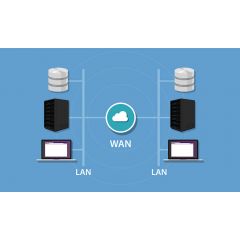What’s the difference between LAN and WAN?
As a business, understanding the network options available helps you build a structure that works today and as you continue to grow. If you’ve done any research, you’ll have come across the terms LAN and WAN. Today’s blog will explain what these acronyms stand for, how they suit business use and the benefits of each.
What is a network?
A network is a group of devices - normally computers, servers, printers and even smartphones - that are connected together. This means they can communicate with each other easily. For businesses, networks are vital. They allow teams to work fluidly together and also share their projects with other areas of the business.
LAN and WAN explained
Two of the most common networks available to businesses are LAN and WAN. Each one has its own benefits and fits the needs of companies differently depending on size and budget.
LAN (Local Area Network)
A local area network (LAN) is a group of devices, such as those mentioned above, that are all found in the same location. Generally, this means they are all inside the same building. For those in office blocks, these devices are normally found on the same floor. These networks are created with ethernet cables or Wi-fi connection - both of which can provide good speeds to support businesses. They are also built with security features, as standard. This ensures that only authorised users can access the information shared here. Depending on your needs, these restrictions can be between departments, as well as the public.
Pros:
- Cost-effective sharing: By allowing multiple users to share devices, businesses can afford to buy more expensive printers and equipment. This improves the quality of the work generated and minimises the risk of costly repairs over time.
- Team saving: Team members from different computers can save their work in one central place where it can be accessed by every colleague.
- Software sharing: Businesses can save money on expensive software too, by hosting it on these networks and allowing colleagues to share.
- Central backup: With information saved and stored in a central place, backups mean that accidentally deleted work can be recovered easily.
- Fast: LAN networks are generally very fast, with speeds of 1GB and more.
Cons:
- Geographical limitations: In order for a LAN to work, all users need to be based within the same location. This can be an issue if you have multiple offices spread out.
WAN (Wide Area Network)
A wide area network is one that connects multiple LANs together. As the name suggests, it can connect networks from multiple locations, making it an ideal choice for growing businesses. You can choose whether to limit your WAN to the business itself or make it accessible to the public. Through these networks, you can communicate and share information further afield and with greater ease. If you have multiple offices, WAN’s allow you to build strong team relationships regardless of distance.
Pros:
- Facilitates growth: WAN’s allow you to expand, adding offices to your business while still maintaining strong communications.
- Near infinite distance: If you need to, these networks can be used across wide distances - near on without restriction.
- Private: These networks create a direct and dedicated connection for your data which limits the risk of hacking.
- Network consistency: The data sent doesn’t have to compete with other Internet content which means the speeds are consistent.
Cons:
- Costly: WAN networks are more expensive to set up, due to the equipment and labour requirements.
- Slower: They are generally slower than LAN networks due to the distance that the data has to travel.
- Security vulnerabilities: To prevent these, you need to have WAN-specific security measures accommodate within your IT security. They may need to encrypt the information and are likely to cost more.
Here at Adept Networks, we specialise in providing the equipment and resources needed to build strong networks within your business. Get in contact today for more information.

